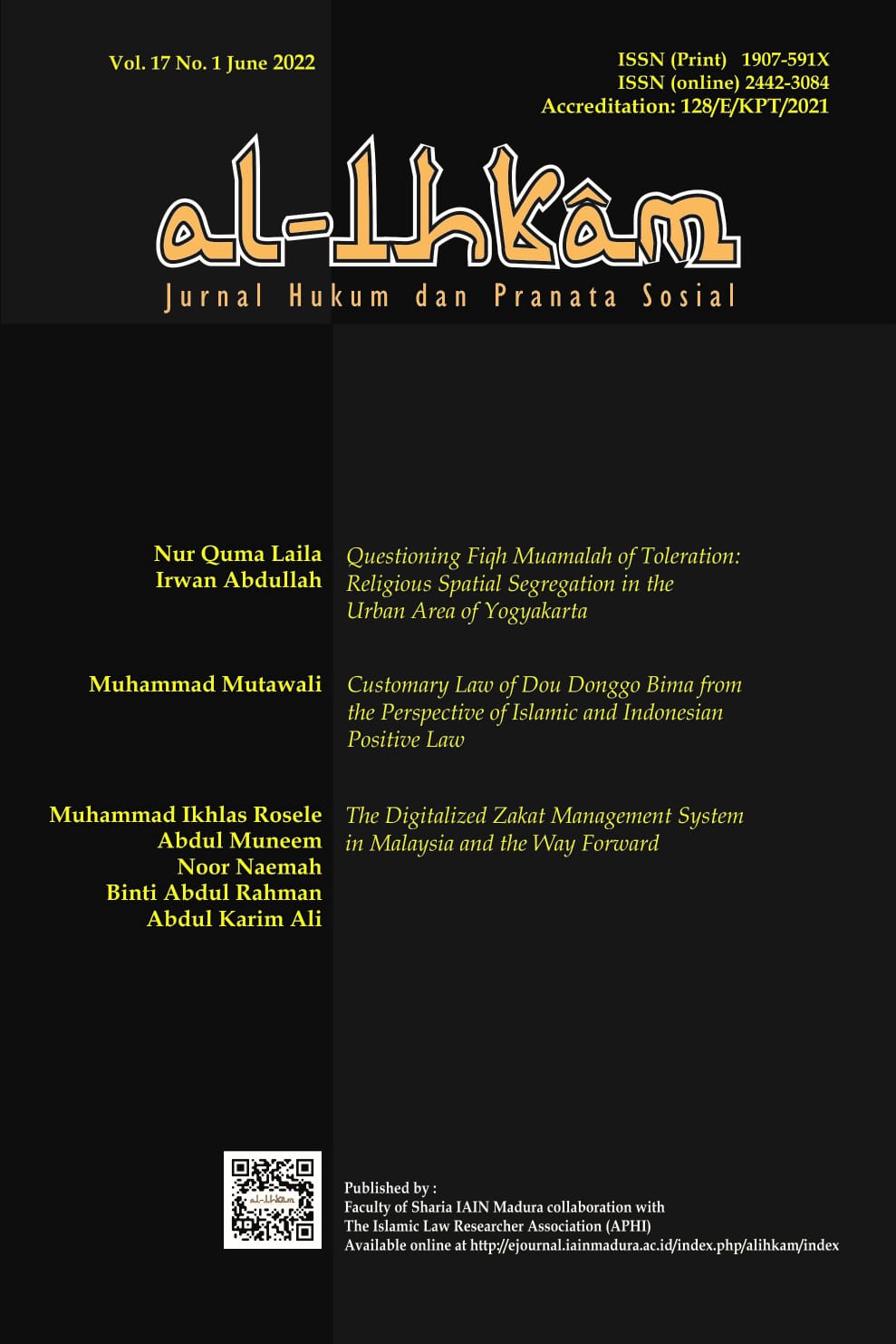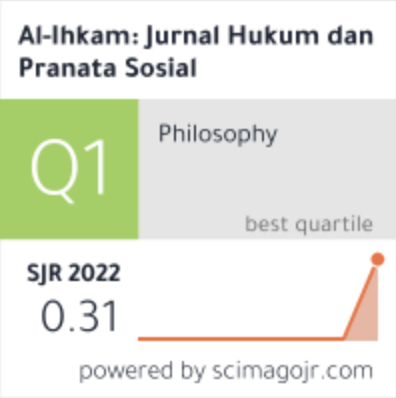The Use of Maxims (al-Qawāʿid al-Uṣūliyyah wa al-Fiqhiyyah) in Legal Argumentation of Sharia Economic Court Decisions in Indonesia
 Abstract views: 867
,
Abstract views: 867
,
 PDF downloads: 604
PDF downloads: 604
Abstract
All sharia economic court decisions in Indonesia are supposed to include sharia principles as the basis for adjudicating the case. Therefore, the judges must be able to understand the legal norms of sharia economics. This study aimed to explore how fundamentalistic maxims (al-qawāʿid al-uṣūliyyah) and jurisprudential maxims (al-qawāʿid al-fiqhiyyah) as parts of sharia economic legal norms or sharia principles were used by judges as legal argumentation in court decisions. We analyzed 384 court decisions categorized as sharia economic cases on the Indonesian Supreme Court website from April 20, 2016, to April 20, 2020, and set them as a universe of cases. Each decision that contained the maxim (qāʿidah) in its legal consideration was selected as relevant case sample and was then analyzed to find how the maxim was used as legal argumentation to respond to a petition and/or demurrer. Then, we found 15 legal maxims from 28 legal argumentations of 14 decisions (3.65% of the universe of cases). In general, the use of those maxims as legal argumentation has already conformed to their conventional usage with a few notes related to specific legal findings (rechtsvinding) in sharia economic cases.
Downloads
References
Ahmad, Abu Umar Faruq, Noor Mohammad Osmani, A.K.M. Shahed, and Mohd. Fazlul Karim. “Shari’ah Maxims and Their Implication on Modern Financial Transactions.” Journal of Islamic Economics, Banking, and Finance 6 (3) (2010): 75–104.
As-Safi, Abdul Baki. Islamic Jurisprudential Maxims 114 Maxims Expounded and Rendered Into English. Amman, Jordan: Amwaj for publication and distribution, 2012. https://www.uop.edu.jo/download/Research/members/424_2062_A.B..pdf.
Baude, William, Adam S Chilton, and Anup Malani. “Making Doctrinal Work More Rigorous: Lessons from Systematic Reviews.” The University of Chicago Law 84 (1) (2017).
Būrnū., Muḥammad Ṣidqī al-. Al-Wajīz Fī Īdhāḥ Qawā’id Al-Fiqh Al-Kuliyyah. Beirut: Muassasah al-Risālah, 1996. https://shamela.ws/book/8379.
Dahlia Farida, Hamid Sarong, Darmawan, Fitriah M Suud. “Legal Protection for Disputing Parties through the Aceh Customary Court.” Al-Ihkam: Jurnal Hukum Dan Pranata Sosial Vol. 15, N (2020). https://doi.org/https://doi.org/10.19105/al-lhkam.v15i1.2250.
Djazuli, H.A. Kaidah-Kaidah Fikih. Jakarta: Kencana, 2006.
Feteris, Eveline T. “Fundamentals of Legal Argumentation.” Springer 2nd ed. Vo (2017). https://doi.org/https://doi.org/10.1007/978-94-024-1129-4.
Ghani, Hafiz Abdul. “A Study of The History of Legal Maxis of Islamic Law.” International Journal of Arts and Commerce 1 (2): 98 (2012).
Hasanzzaman. The Economic Relevance Of The Sharia Maxims (Al Qawaid Al Fiqhiyah). Jeddah: Scientific Publishing Centre, King Abdulaziz University., 1997.
Ibnu Majah, Muhammad Bin Yazid Al-Quzwini. Sunan Ibnu Majah. T: Abdul Baqi: Daar Ihya’ al-Kutub al-arabiyyah, n.d.
Ibrāhīm ibn Mūsā Abū Isḥāq al- Shāṭibī. The Reconciliation of The Fundamentals of Islamic Law (Al-Muwāfaqāt Fī Uṣūl Al-Sharī’a). Edited by Edited by ’Abd Allah Darrāz. Translated by Imran Ahsan Khan Nyazee. Reading: Garnet Publishing, 2012.
Masyhudi Muqorobin. “Qawaid Fiqhiyyah Sebagai Landasan Perilaku Ekonomi Umat Islam: Suatu Kajian Teoritik.” Jurnal Ekonomi Dan Studi Pembangunan, Vol. 8, No (2007): 198–214. https://journal.umy.ac.id/index.php/esp/article/view/152.
Maulana, Irwan. “Implementasi Qawaid Fiqhiyyah Dalam Ekonomi Dan Industri Keuangan Syariah.” Jurnal Asy-Syukriyyah Vol. 19, N (2018). https://doi.org/https://doi.org/10.36769/asy.v19i2.34.
Mohamed Elewa Badar. “Islamic Law (Shari’a) and the Jurisdiction of the International Criminal Court.” Leiden Journal of International Law p 431. 24 (2): 43 (n.d.). https://doi.org/https://doi.org/10.1017/S0922156511000082.
Muḥammad al- Zuhaylī. Al-Qawā’id Al-Fiqhiyyah Wa Tatbīqātuhā Fī Al-Madhāhib Al-Arba’ah. Damaskus: Dār al-Fikr, 2006. https://al-maktaba.org/book/21786.
Muhsin, Sayyed Mohamed, Muhammad Amanullah, and Luqman Zakariyah. “Framework for Harm Elimination in Light of the Islamic Legal Maxims.” Islamic Quarterly 63, no. 2 (2019): 233–72.
Rabb, Intisar A. Doubt in Islamic Law: A History of Legal Maxims, Interpretation, and Islamic Criminal Law. Cambridge: Cambridge University Press, 2015. https://doi.org/https://doi.org/10.1017/CBO9781139953054.
Shahrul Hussain. A Treasury of Sacred Maxims: A Commentary on Islamic Legal Principles (Treasury in Islamic Thought and Civilization). Markfield: Kube Publishing, 2016.
Shettima, Muhammad, Hamma Adam Biu, and Muhammad Al-Amin Deribe. “The Relevance of Islamic Legal Maxims In Determining Some Contemporary Legal Issues.” IIUM Law Journal 24 (2) (2016): 415–451. https://doi.org/https://doi.org/10.31436/iiumlj.v24i2.254.
Standar Format BAS. “Standar Format BAS Dan Format Putusan Pengadilan Agama/Mahkamah Syar’iyah.” Badan Peradilan Agama Mahkamah Agung RI, 2014. https://badilag.mahkamahagung.go.id/pengumuman-elektronik/pengumuman-elektronik/standar-format-bas-dan-putusan.
Suyūtī, Jalāl al-Dīn al-. Al-Ashbāh Wa Al-Naẓāir. Beirut: Dār al-Kutub al-’Ilmiyyah, 1990. https://al-maktaba.org/book/21719.
Zahri, A. “Mencermati Template Putusan Badilag.” Badan Peradilan Agama Mahkamah Agung RI, 2017. https://badilag.mahkamahagung.go.id/artikel/publikasi/artikel/mencermati-template-putusan-badilag-oleh-h-a-zahri-s-h-m-hi-19-1.
Zakariyah, Luqman. Islamic Legal Maxims (Al-Qawāʿid Al-Fiqhiyya): Historical Development, Concepts, and Content. Brill: Nijhoff, 2015. https://doi.org/https://doi.org/10.1163/9789004304871_003.
Zarkashī, Badru al-Dīn al-. Al-Manthūr Fī Al-Qawāʿid Al-Fiqhiyyah. Madīnah al-Kuwayt: Wazārah al-awqāf al-Kuwaytīh, 1985. https://shamela.ws/book/21592.
Zuhaylī, Muḥammad al-. Al-Qawā’id Al-Fiqhiyyah Wa Tatbīqātuhā Fī Al-Madhāhib Al-Arba’ah. Damaskus: Dār al-Fikr, 2006. https://al-maktaba.org/book/21786.
Copyright (c) 2022 AL-IHKAM: Jurnal Hukum & Pranata Sosial

This work is licensed under a Creative Commons Attribution-ShareAlike 4.0 International License.
In order to be accepted and published by Al-Ihkam: Jurnal Hukum dan Pranata Sosial, author(s) submitting the article manuscript should complete all the review stages. By submitting the manuscript, the author(s) agreed to the following terms:
- The copyright of received articles shall be assigned to Al-Ihkam: Jurnal Hukum dan Pranata Sosial as the publisher of the journal. The intended copyright includes the right to publish articles in various forms (including reprints). Al-Ihkam: Jurnal Hukum dan Pranata Sosial maintain the publishing rights to the published articles.
- Authors are permitted to disseminate published articles by sharing the link/DOI of the article at Al-Ihkam: Jurnal Hukum dan Pranata Sosial. Authors are allowed to use their articles for any legal purposes deemed necessary without written permission from Al-Ihkam: Jurnal Hukum dan Pranata Sosial with an acknowledgment of initial publication to this journal.
- Users/public use of this website will be licensed to CC-BY-SA.



.png)
_1.png)










